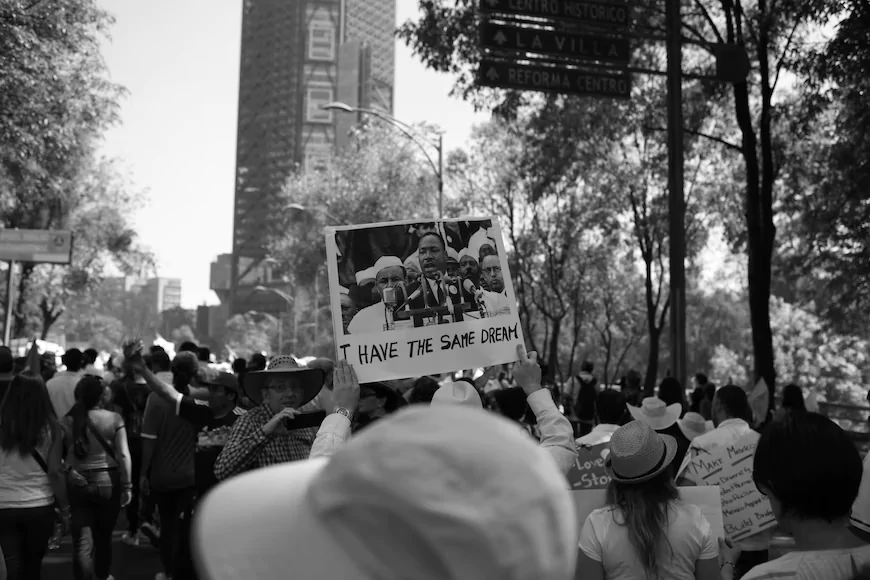An alarming issue is plaguing the United States’ education sector: the increasing college-going gap between Black and white Americans. The gap, which has long been a problem, is reportedly getting worse. But why is this happening, and how is this trend affecting aspiring Black college students? We will be exploring the impact on American education today.

✅ AI Essay Writer ✅ AI Detector ✅ Plagchecker ✅ Paraphraser
✅ Summarizer ✅ Citation Generator

By Jerónimo Bernot from unsplash.com
Key Takeaways:
- Black enrollment and graduation rates in higher education are decreasing alarmingly.
- Economic inequality and early educational hurdles amplify the education gap for Black students.
- The uncertain future of affirmative action could further erode racial diversity in colleges.
Personal Struggles: A Snapshot
For Patrick Ben III, a 22-year-old Black graduate from the University of Illinois at Urbana-Champaign, the struggle began early. A product of Chicago’s South Side, his high school lacked Advanced Placement courses, and guidance for college and financial aid applications was scarce.
Reflecting on his experiences, Ben says, “I understood that a lot of the things I did to prepare for college I would have to do myself.” When he joined university, he was acutely aware of his disadvantage, sharing, “Other students from more affluent places were sitting there in class talking about how they’ve already done this stuff, where I’m thinking, all of this is new to me.”
A Fading Dream of Diversity?
This troubling trend comes as states push back against diversity programs at public universities and the Supreme Court deliberates over the future of affirmative action in admissions. The question arises, has the playing field truly been leveled between white and Black Americans in the realm of higher education? Gary Orfield, co-director of the Civil Rights Project at the University of California, Los Angeles, sadly states, “we’re not making progress. The gaps are huge, and there’s no prospect of them closing in the foreseeable future. We’re going backwards.”
A Bleak Picture: Black Enrollment and Graduation Rates
Despite aspirations for higher education, black enrollment has been steadily declining. The National Center for Education Statistics and the National Student Clearinghouse Research Center reveal concerning numbers:
| Year | % Decline in Black Enrollment |
| 2010-2020 | 22% (over 650,000 students) |
| 2020-2023 | Additional 7% |
Furthermore, the disparity in graduation rates has widened. A mere 34% of Black adults hold associate degrees or higher, compared to 50% of white adults, according to the Lumina Foundation. Wisdom Cole, national director of the NAACP youth and college division, observes, “There’s a facade that’s trying to be presented that everything is OK. But we never were okay, even before the pandemic.”
The Root of Inequity: Financial Constraints
One major factor contributing to this inequity is cost. The economic disparity between the average Black and white household means that Black Americans are far more likely to accrue larger amounts of student loans to pursue higher education.

This results in Black graduates owing nearly 50% more than their white counterparts, according to the Brookings Institution. Furthermore, racial disparities persist as Black graduates often earn less than white graduates, making loan repayment a significant challenge.
Beyond College: Racial Disparities in the Workforce
The story doesn’t end with graduation. The NAACP finds that Black college and university graduates earn 15% less than their white classmates and are more likely to be underemployed. Cole explains the grim reality of the workforce, “University degree or not, you’re facing discrimination in the workplace when it comes to hiring and when it comes to salaries.”
The Institute for College Access and Success reveals a disturbing stat – almost 40% of Black graduates default on their college loans within 12 years, compared to 12% of white graduates. This, coupled with higher student loan debt and lower earnings, further widens the equity gap for Black graduates.
Early Disadvantages: K-12 Education Inequality
Even before college, Black students face significant hurdles. They are more likely to attend high-poverty primary and secondary schools and less likely to have access to advanced placement courses. These early educational disadvantages have a domino effect, hindering Black students’ college enrollment and academic performance.
Challenges in College: Completion Rates and Discrimination
Once enrolled in college, Black students face a new set of challenges. Higher proportions of Black students report feeling discriminated against on campus and have considered dropping out as a result. Such experiences erode their sense of belonging, further influencing completion rates and reinforcing the racial diversity issue in colleges.
Affirmative Action and Equity Gap: A Futile Battle?
With the potential removal of affirmative action, the Georgetown University Center on Education and the Workforce suggests that selective colleges and universities may become even less racially diverse. This echoes Gary Orfield’s bleak outlook: “We’re actually looking at projections that show we’re not going to be really closing this gap for a very long time, if ever.”
Read more:
Battling Cheating and Laziness – How to Get Back on Study Track
A Student Struggles With Coding Motivation Crisis. Reddit Community Steps in with Lifehacks
Demystifying Programming — Yes, You Can Learn It Without Prior Coding Experience
Follow us on Reddit for more insights and updates.





Comments (0)
Welcome to A*Help comments!
We’re all about debate and discussion at A*Help.
We value the diverse opinions of users, so you may find points of view that you don’t agree with. And that’s cool. However, there are certain things we’re not OK with: attempts to manipulate our data in any way, for example, or the posting of discriminative, offensive, hateful, or disparaging material.